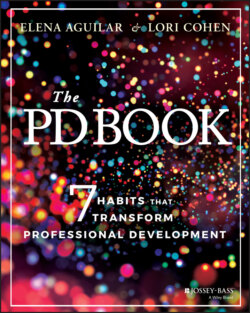Читать книгу The PD Book - Elena Aguilar - Страница 23
What If PD Could Be More Like a Party?
ОглавлениеWhen you became a teacher, it's likely that you formed a vision for who you wanted to be based on two things: who you aspired to emulate, and who you didn't want to be like. This may have been a conscious process or an unconscious one. But often a vision is shaped by what we've experienced and by what we strive to replicate and what we want to reject.
When we began providing PD, we had thoughts like, I want to welcome people into the room the way I once observed Mr. G, and I never want to talk down to teachers like Mrs. K did. We identified behaviors and ways of being we wanted to replicate and ones we intended to reject.
We also thought about the overall feeling of PD. We'd been to many PD sessions that felt tedious and dreary; we wanted to create learning experiences that felt refreshing and gratifying. We wanted people to say, “That went by so fast!” And, “When is our next session?” We wanted to observe participants walking to their cars together afterward still talking about the content and laughing and exchanging contact information. We knew that if PD felt good, participants would be more likely to want to come, to show up eager to learn, and to take risks and ask questions, and ultimately, we knew that more learning would occur.
We're now going to present an extreme dichotomy: When characterizing the atmosphere of PD, on one end of the continuum, PD can feel like a punishment, like a prison. On the other end of the continuum, PD can feel like a festive gathering of friends. Most of us have probably attended a lot of PD that falls in the middle: It's fine, but immemorable. We wonder, what if PD could feel more like a party?
This question elevates one of our primary beliefs about what it takes to create transformative PD, which is that transformative PD occurs when the learning atmosphere feels very different than what we're typically accustomed to. When we suggest that PD could feel like a party, we're not actually imagining a large, loud, raucous gathering in which people have superficial conversations. We're referencing the aspects of a party that are universally appreciated: a sense of celebration, a clear and meaningful purpose for convening, the possibility of being with others whose company you appreciate, and perhaps also something that makes the gathering feel special—whether that is the food, the location, the decorations, or just the way you're made to feel like your presence is truly welcome.
Imagining PD as being like a party—or more like a party—has become a conceptual aspiration for us. Again, just to be clear: Neither of us would say we love parties; no one we know would describe us as “party people.” But we love the possibility embedded in thinking about PD as being like a party. This metaphor evokes an energy that is a sharp contrast to what characterizes most learning spaces, and so it serves as a useful counterpoint to work toward.
If PD was more like a party, you'd see teachers sitting in small groups around a fire telling each other stories; you'd hear people expressing affection and appreciation for each other and wondering how they'd been matched up in the same group together. You'd also see people having hard conversations and challenging each other's thinking, and you might witness educators grappling with new ideas and skills. PD would still be purposeful and rigorous and structured. But the atmosphere would be lighter, more joyful, and characterized by meaningful connections between participants.
When we say, “What if PD could be like a party?” we're pointing toward the possibility of a gathering that feels very different from traditional PD, toward the social and emotional conditions needed for deep connection and learning. That said, we're also not opposed to the occasional costume, streamer, or rock‐paper‐scissors tournament. As we share the habits you can use to create transformative PD, we'll occasionally bring you back to this notion that PD could be something that feels fundamentally different from the typical PD experience, that perhaps PD could feel more like a party.
